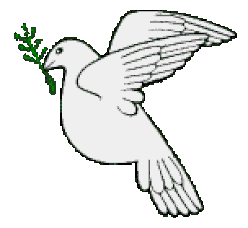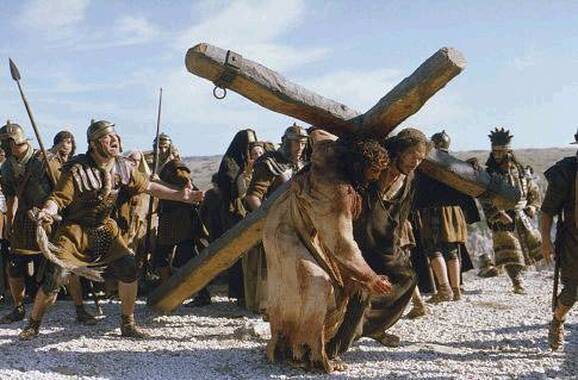Mark 15:20-47
Lesson 98
Lesson 98
Read both the "King James Bible" and the "New Living Translation."
In this lesson:
Jesus delivers the gift of salvation.
Jesus delivers the gift of salvation.
Simon helps Jesus carry the cross.
From the Movie "The Passion of the Christ."
From the Movie "The Passion of the Christ."
The slow death.
Crucifixion!
Crucifixion!
Crucifixion wasn't just a means of execution; it was a psychological weapon used to intimidate anyone who challenged the authority of the Roman empire. Crucifixion was designed by the Romans to inflict maximum pain while slowly killing. Death on the cross was reserved for traitors, slaves, foreigners, and the lowest of criminals. Rome allowed slavery but considered crucifixion so horrendous it was illegal to crucify a Roman citizen, no matter what their crime. The first public crucifixions took on a carnival atmosphere and attracted large, boisterous crowds. But by the time Jesus hung on the cross crucifixions had become routine. The loud curious mobs had long disappeared leaving only Jesus' mother, and a handful of followers and accusers to watch the Messiah die. To most of the people of Jerusalem, the Messiah's death was just another ho-hum execution.
With the jeers of the crowd filling their ears, the ill-fated prisoners were led to their execution site and stripped naked, adding to their humiliation. Then primitive iron nails six to eight inches long with two inch sharpened points were pounded through their hands or wrists with a heavy mallet. Experienced executioners knew precisely where to place the
nails to cut the tendons that run the length of the arm up to the shoulders. With severed tendons, the crucified were forced to use their back and shoulder muscles to support their weight as they hung on the up-righted cross. Once the wrists of the struggling victim were hammered down, a single nail was then driven through both feet to anchor them to the wooden cross. The crucifix was then raised, and the base of the cross dropped into a three-foot-deep hole with a jarring thud. If they were unlucky enough to have inexperienced or hurried executioners, one or both of the struggling
prisoner's wrists could come loose as the cross dropped into place, causing them to fall forward with their feet still fastened to the crucifix. They were then brought back down screaming and re-nailed.
After the helpless victim was secured and the cross set upright in the air, the crucified would be on full display to the eyes of the taunting crowd and the death watch would begin. Death on the cross was slow. Their gradual physical decline gave the condemned time to think about their death as they writhed in agony. The intense physical and psychological misery steadily increased as the sufferer slowly succumbed to dehydration, loss of blood, trauma, shock, fear, pain, and sheer exhaustion. Most died from suffocation when they couldn't hold themselves up on the cross any longer. As the weight of the weakening upper torso collapsed over the diaphragm breathing became difficult. The victims found they could take air in but couldn't exhale it. The only way to catch a breath was to pull themselves up the cross by their nailed wrists. Pulling themselves up caused horrific pain as the punctured wrists bore the entire weight of the fading body. Once the crucified raised themselves up on the cross, their arm and shoulder muscles quickly cramped and weakened. When they could take the pain no longer the condemned would sink back down and rest their weight on the nail driven through their feet. This relieved the pain in the upper torso, but the agony in their feet, ankles, and legs sent throbbing shivers through their body, and the pectoral muscles in the chest again became temporarily paralyzed. In the panic for another breath, they would again pull themselves back up the cross by their wrists. If a man passed out, he was quickly jarred awake as his body gasped for air. This up and down struggling was repeated over and over until death finally came. In Jesus' case, it took over three hours. If the crucified were still alive when the executioners were ready to leave their legs were broken to keep them from pushing themselves up the cross for another breath. With shattered legs, death came quickly. It was not until 313 AD, two hundred and eighty years after Jesus died on the cross, that Rome finally outlawed crucifixion.
With the jeers of the crowd filling their ears, the ill-fated prisoners were led to their execution site and stripped naked, adding to their humiliation. Then primitive iron nails six to eight inches long with two inch sharpened points were pounded through their hands or wrists with a heavy mallet. Experienced executioners knew precisely where to place the
nails to cut the tendons that run the length of the arm up to the shoulders. With severed tendons, the crucified were forced to use their back and shoulder muscles to support their weight as they hung on the up-righted cross. Once the wrists of the struggling victim were hammered down, a single nail was then driven through both feet to anchor them to the wooden cross. The crucifix was then raised, and the base of the cross dropped into a three-foot-deep hole with a jarring thud. If they were unlucky enough to have inexperienced or hurried executioners, one or both of the struggling
prisoner's wrists could come loose as the cross dropped into place, causing them to fall forward with their feet still fastened to the crucifix. They were then brought back down screaming and re-nailed.
After the helpless victim was secured and the cross set upright in the air, the crucified would be on full display to the eyes of the taunting crowd and the death watch would begin. Death on the cross was slow. Their gradual physical decline gave the condemned time to think about their death as they writhed in agony. The intense physical and psychological misery steadily increased as the sufferer slowly succumbed to dehydration, loss of blood, trauma, shock, fear, pain, and sheer exhaustion. Most died from suffocation when they couldn't hold themselves up on the cross any longer. As the weight of the weakening upper torso collapsed over the diaphragm breathing became difficult. The victims found they could take air in but couldn't exhale it. The only way to catch a breath was to pull themselves up the cross by their nailed wrists. Pulling themselves up caused horrific pain as the punctured wrists bore the entire weight of the fading body. Once the crucified raised themselves up on the cross, their arm and shoulder muscles quickly cramped and weakened. When they could take the pain no longer the condemned would sink back down and rest their weight on the nail driven through their feet. This relieved the pain in the upper torso, but the agony in their feet, ankles, and legs sent throbbing shivers through their body, and the pectoral muscles in the chest again became temporarily paralyzed. In the panic for another breath, they would again pull themselves back up the cross by their wrists. If a man passed out, he was quickly jarred awake as his body gasped for air. This up and down struggling was repeated over and over until death finally came. In Jesus' case, it took over three hours. If the crucified were still alive when the executioners were ready to leave their legs were broken to keep them from pushing themselves up the cross for another breath. With shattered legs, death came quickly. It was not until 313 AD, two hundred and eighty years after Jesus died on the cross, that Rome finally outlawed crucifixion.





